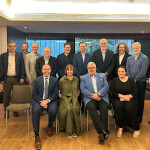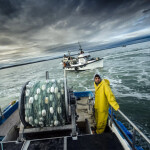Editor’s Note: This is the second in a two-part series on Common Fisheries Policy reform. Read the first part here.
In 2012 the Council of Ministers reached a general approach, both on the basic regulation and on the Common Market Organisation (CMO).
The general approach is not an official step in the co-decision procedure, so it does not really bind the member states, but it is taking a position or an orientation toward further work.
In general, the CMO represents "… better targeted intervention, a stronger role for the producer organizations to make them central, and key actors in a decentralized policy and better labeling," said Franz Lamplamair, advisor for fisheries policy at the European Commission. "Most of it is there" in the results of the Parliament's first reading and the general approach of the Council, he added.
And while the European Commission had proposed a voluntary, softer approach on eco-labeling, the European Parliament has proposed a new EU scheme.
"If there is a need because there are so many different and conflicting claims, you can set criteria at a European level. In our view an EU scheme was not the best idea," said Lamplamair.
At the Parliament level, also 'positive news' witnessed for the market organization legislation proposal. According to the Commission, Parliament has already finalized its first reading and voted Struan Stevenson's report on 20 June in the Committee, and voted in plenary on 12 September.
At the European Parliament level a rapporteur is appointed for each proposal from the European Commission and drafts the report that is put to vote in the committee responsible.
Germany's Ulrike Rodust presented the draft report on the basic regulation to Parliament in May. More than 2,500 amendments to the report were tabled by Members of European Parliament (MEPs). As a result, while a vote was due in the Fisheries Committee in October, this has been delayed until November.
"The rapporteur is working very hard to find compromises to reach the basis for a vote on Committee," said Lamplamair.
On the European Maritime and Fisheries Fund (EMFF), the general approach is foreseen for the October Council meeting, taking place in the week of 22 October. But Franz warned of a time issue, with recent meetings between the ambassadors to the EU, who prepare all the Council of Ministers' meetings, suggesting there's a lot of issues that they couldn't solve.
For the EMFF, the report rapporteur is France's Alain Cadec, and the timelines there are slipping as well. The deadline for amendment to his draft report is December. "We can imagine it will take a few months, we can expect there will be hundreds, if not thousands, of amendments. So we will slip well into 2013," said Lamplamair.
And yet other element holding up the timetable for CFP reform is Parliament. As a result of the Treaty of Lisbon (enforced December, 2009), for the first time the CFP is subject to co-decision. Before the treaty only the Council of Ministers decided on the CFP, and Parliament had the right to see and comment, but not to change text. Today Parliament has a legislative role and can change policy.
There is one exception: article 43/3 states that quantified fishing opportunities — yearly tons and fishing days — are to be decided by Council alone. And while the Council believes the rules for setting the catch, which are part of these plans, must be set by Council only, Parliament disagrees in light of co-decision.
According to Lamplair, this means there's a “big battle ongoing between the two institutions, which is holding up reform, and even ongoing proposals and long term plans from RACs [regional advisory councils].”
The second issue is one of delegating powers. In order to have a workable solution for regionalisation, the Commission has proposed delegating powers on the basis of an agreement between member states of the region. The Council disagrees, and “there's a power struggle going on which is really holding us up.”





